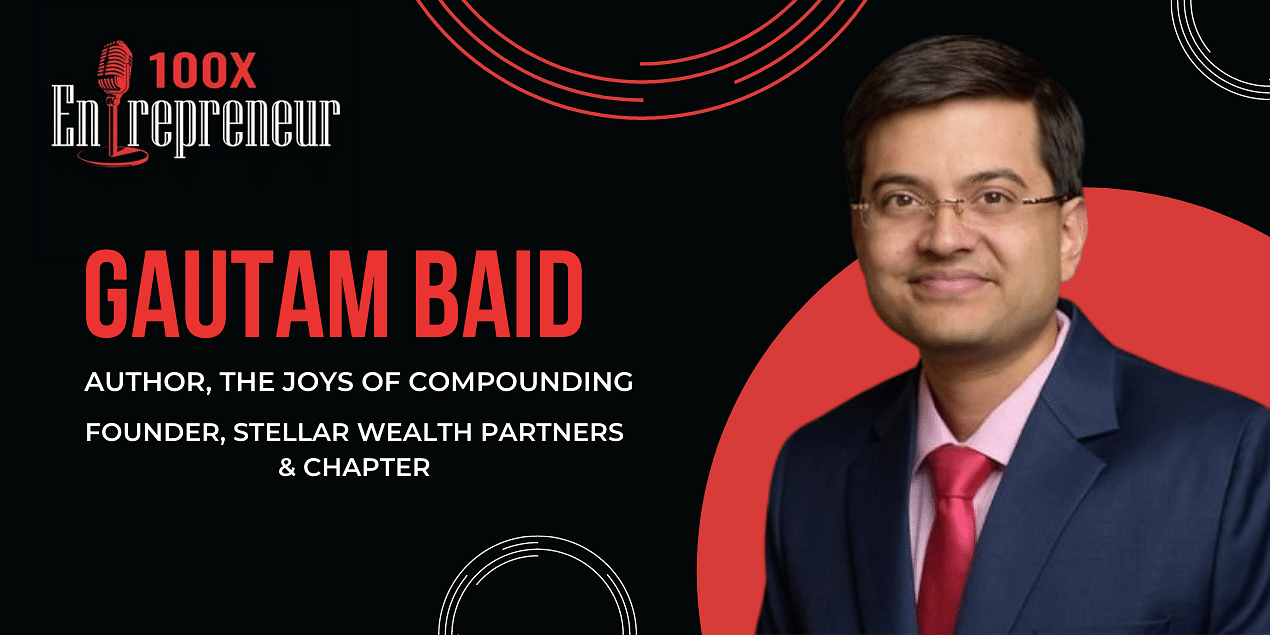Gautam Baid was pulled into the stock market frenzy when Dalal Street was witnessing a euphoric bull market phase between 2003 and 2007. He purchased mutual funds in the energy and steel sectors only to see his investments crash by 70 to 80 percent a year later. Gautam calls that initial loss his “admission fees” into the Indian stock market.
But the last decade has been an eventful journey in pursuing his passion.
In 2015, he quit his job as an investment banker and moved to the US. For 15 months, he read incessantly about investing while working as a front desk clerk at a hotel in San Francisco, and bagged a dream job as a portfolio manager after facing 1,300 rejections.
His self-published book, The Joys of Compounding, became an international bestseller and opened new avenues – from many technology startups in the Silicon Valley approaching him for collaboration to Myles Thompson from Columbia Business School offering a publishing contract.
Today, the 38-year-old is also a CFA and Founder of CFA Stellar Wealth Partners, a SEBI-registered research analyst firm and small case manager for investors in the Indian stock market.
In a conversation with Siddhartha Ahluwalia, Founder and Host of 100x Entrepreneur, he says nothing teaches the biggest lessons of life like an empty wallet and empty stomach, referring to his early days in the US.
Value investing for wealth creation
Gautam is bullish on value investing as the ultimate investment strategy because “the basic principle of buying something for less than what it is worth will never get old”.
He quotes Philip Fisher that the stock market is filled with individuals “who know the price of everything, but the value of nothing”. But instead of focusing on volatile stock prices, which keep bobbing up and down every day, it is wiser to follow the underlying business values.
However, Gautam emphasises there is no single strategy that works all the time and in every kind of market, and hence it is essential to build up one’s investing arsenal to be able to hunt for value from within different areas.
“It is because a bull market is always on at all points of time in some specific sectors of the Indian stock market…that is why investors should always be alert about which stocks and sectors are actually breaking out to all-time highs during a bear market because the market itself will tell you where the next leg of winners and next bull cycle will come from. Just pay attention and respect the collective wisdom of the stock market,” he says.
Gautam says his own personal investment philosophy significantly expanded with time and experience in the market.
As a beginner, he started by reading Benjamin Graham’s The Intelligent Investor. From investing and putting money in cheaply valued stocks, he moved on to buying quality businesses at reasonable fair valuations as he read Warren Buffett, Charlie Munger, and Philip Fisher.
Good investing, he says, is all about individual bottom up stock picking, focusing on the macro-economics of each individual business and ignoring all the noise around geopolitical tensions, disease outbreaks, rising interest rates, rising inflation, and all the noise in the media.
The investment checklist
Gautam says it takes discipline to make long-term gains in the stock market.
More importantly, before making any investment, one must study about the company, its competitors, company filings, and annual reports of the last 10 years. He also suggested reading the financial statements, outlining the management discussion and analysis section where one can grasp changes in management tone and industry outlook and observe recent trends in insider shareholding.
Once the initial groundwork is covered, one can proceed to study parameters such as income statement analysis, cash flow analysis, balance sheet analysis, returns ratios analysis, operating efficiency analysis, management, and quality analysis.
Gautam’s list of must-reads including More Than You Know by Michael Mauboussin, Seeking Wisdom by Peter Bevellin, and Poor Charlie’s Almanack which is edited by Peter Kaufman on multidisciplined thinking.
To build a sound foundation in investing, he suggests beginners read One Up on Wall Street by Peter Lynch, Common Stocks and Uncommon Profits by Philip Fisher, and The Most Important Things by Howard Marks.
Today, Gautam has generated enough wealth to have his calendar free to dedicate time to his family and friends, creative pursuits, philanthropy, personal health, and reading and learning activities.
The biggest takeaway for him has been the power of relentlessly pursuing one’s passion. “Compounding will bestow its magic and benefits upon you only after a very long time, after testing your patience and conviction to the fullest,” he says.
To know more, listen to the entire podcast here
03:46 – Family background and childhood
09:21 – Compounding of knowledge
14:28 – Importance of an empty pocket and empty stomach
21:19 – Thoughts on value investing
31:35 – Checklists in investing decisions
33:15 – 3 biases every investor should know
49:28 – ‘Time is the new status symbol’
50:35 – Book recommendations








![Read more about the article [Funding alert] Avataar raises $45M in Series B from Tiger Global and Sequoia Capital India](https://blog.digitalsevaa.com/wp-content/uploads/2022/01/Imagedbzw-1641548409508-300x150.jpg)

